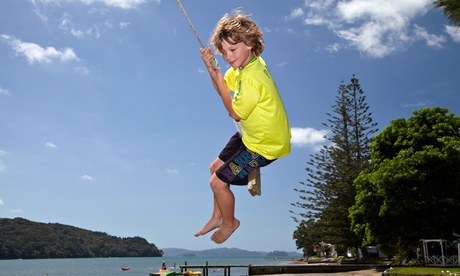
“You’ll take your eye out with that” is our family motto. I’m the hovering mum by the five-year-old on the monkey bars in the park. So how embarrassing to see research and a position statement on active outdoor play in the International Journal of Environmental Research and Public Health. It says children need “risky play” (which includes climbing and jumping from a height, unsupervised play where a child could get lost, cycling fast down a hill, playing with knives, or playing near water or cliffs). It adds that children who do so improve their reaction time in detecting risk, increase their self-esteem and are less likely to takes risks related to sex and drugs as adolescents.
An English study found that, while 86% of children between the ages of seven and 11 went to school without an adult in the 1970s, this fell to 25% in 2010.
A Canadian study found that 81% of parents of 10- to 12-year-olds were worried about “stranger danger”, yet researchers point out that the odds of abduction by a total stranger are one in 14m. Serious risks from playgrounds (ie trapped heads and strangulation by equipment when parks used to have ropes) have largely been eliminated. Two large New Zealand studies of nearly 31,000 children reported no head or spine fractures from playgrounds in more than two and half years. Broken bones (mostly upper arm) do happen, but are rare – the Ottawa study reports an average of 1.5 injuries per 10,000 hours of play. So will you let your child play unsupervised?
The solution
I phoned the author of the position statement, Mark Tremblay, to say that parents, understandably, don’t want to take risks with their children. “Well never put your kid in a car – it’s the most common place for a child to die,” he said sternly. He believes that we are fixated on extraordinarily rare events. “Parents have to have a balanced view of this. Their child at home is 500 times more likely to meet a stranger – the internet has many cyberbullies. Children won’t develop resilience without getting a little hurt and getting back up again.”
The evidence suggests that children self-regulate in play in response to risks. A sedentary lifestyle might stop them dislocating shoulders, but leads to obesity and chronic disease in later life.
Tremblay passionately believes that playing unsupervised outside leads to better self-regulation and psychological health. There’s even a term for overprotected kids: risk deficit disorder. Ouch. Tremblay suggests parents wean themselves by first letting their children go off on their own for 20 minutes (having made sure they know how to cross the road). Not doing this may be riskier to their health.

